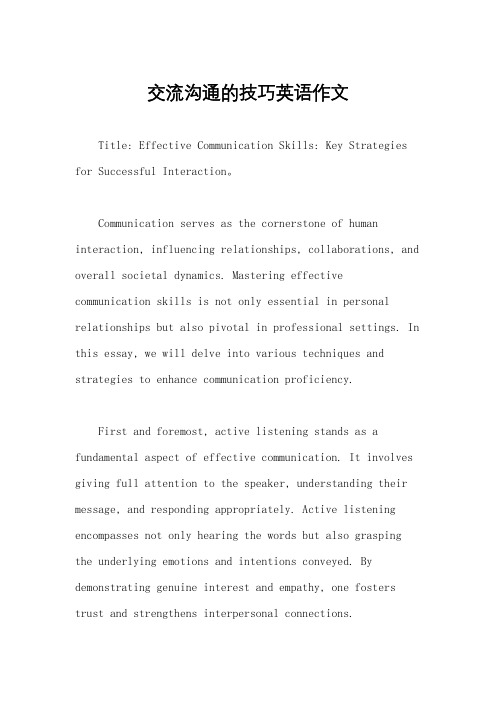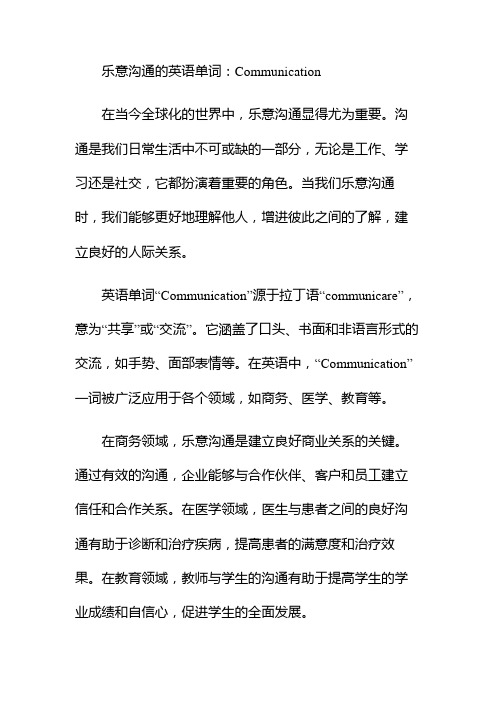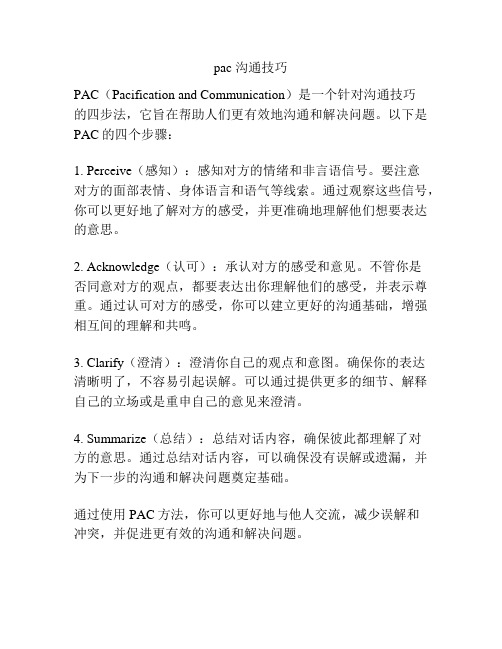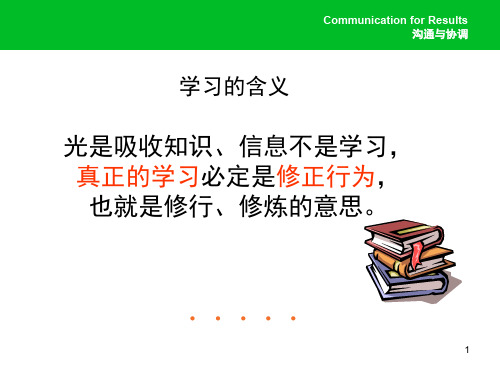交流技巧 Cmmunication
交流沟通的技巧英语作文

交流沟通的技巧英语作文Title: Effective Communication Skills: Key Strategies for Successful Interaction。
Communication serves as the cornerstone of human interaction, influencing relationships, collaborations, and overall societal dynamics. Mastering effective communication skills is not only essential in personal relationships but also pivotal in professional settings. In this essay, we will delve into various techniques and strategies to enhance communication proficiency.First and foremost, active listening stands as a fundamental aspect of effective communication. It involves giving full attention to the speaker, understanding their message, and responding appropriately. Active listening encompasses not only hearing the words but also grasping the underlying emotions and intentions conveyed. By demonstrating genuine interest and empathy, one fosters trust and strengthens interpersonal connections.Moreover, clarity and conciseness in expression play a pivotal role in effective communication. Communicating ideas succinctly and articulately ensures that the message is easily comprehensible to the recipient. Avoiding jargon and unnecessary complexity prevents misinterpretation and facilitates smoother exchanges. Additionally, organizing thoughts logically and structuring communication in a coherent manner enhances clarity and fosters understanding.Nonverbal communication, often overlooked yet immensely powerful, significantly influences interpersonal dynamics. Body language, facial expressions, gestures, and tone of voice convey subtle cues that complement verbal messages. Being mindful of nonverbal signals and aligning them with verbal communication enhances credibility and reinforces the intended message. Maintaining eye contact, adopting an open posture, and mirroring the body language of the interlocutor establish rapport and facilitate effective communication.Furthermore, empathy and emotional intelligence areindispensable in fostering meaningful connections and resolving conflicts amicably. Understanding others' perspectives, acknowledging their feelings, and responding with empathy cultivates trust and mutual respect. Emotional intelligence enables individuals to navigate interpersonal challenges adeptly, recognize emotional triggers, and regulate their own emotions effectively. By fostering an emotionally supportive environment, one fosters open communication and collaboration.Cultural sensitivity and awareness are imperative in today's interconnected world, where interactions span diverse cultural backgrounds. Recognizing cultural nuances, norms, and communication styles prevents misunderstandings and fosters inclusive dialogue. Embracing diversity and demonstrating respect for cultural differences enriches communication experiences and promotes cross-cultural understanding. Additionally, adapting communication strategies to accommodate cultural diversity demonstrates flexibility and enhances interpersonal effectiveness.Effective communication also entails the skillfulmanagement of conflicts and disagreements. Rather than avoiding or escalating conflicts, addressing them constructively promotes mutual understanding and strengthens relationships. Active listening, empathy, and assertiveness are key in navigating conflictsdiplomatically and reaching mutually satisfactory resolutions. By fostering a collaborative problem-solving approach, conflicts can be transformed into opportunities for growth and reconciliation.Moreover, fostering a culture of constructive feedback facilitates continuous improvement and professional growth. Providing specific, actionable feedback in a supportive manner enables individuals to enhance their performance and refine their communication skills. Conversely, receiving feedback gracefully and utilizing it to self-reflect and adapt fosters personal development and enhances communication proficiency.In conclusion, effective communication skills are indispensable in navigating interpersonal relationships, fostering collaboration, and achieving success in bothpersonal and professional spheres. By cultivating active listening, clarity in expression, nonverbal communication proficiency, empathy, cultural awareness, conflict resolution skills, and a culture of constructive feedback, individuals can elevate their communication effectiveness and cultivate harmonious interactions. As we continue to navigate an increasingly interconnected world, mastering these communication strategies becomes ever more essential in fostering understanding, empathy, and cooperation across diverse contexts and cultures.。
乐意沟通的 英语单词

乐意沟通的英语单词:Communication在当今全球化的世界中,乐意沟通显得尤为重要。
沟通是我们日常生活中不可或缺的一部分,无论是工作、学习还是社交,它都扮演着重要的角色。
当我们乐意沟通时,我们能够更好地理解他人,增进彼此之间的了解,建立良好的人际关系。
英语单词“Communication”源于拉丁语“communicare”,意为“共享”或“交流”。
它涵盖了口头、书面和非语言形式的交流,如手势、面部表情等。
在英语中,“Communication”一词被广泛应用于各个领域,如商务、医学、教育等。
在商务领域,乐意沟通是建立良好商业关系的关键。
通过有效的沟通,企业能够与合作伙伴、客户和员工建立信任和合作关系。
在医学领域,医生与患者之间的良好沟通有助于诊断和治疗疾病,提高患者的满意度和治疗效果。
在教育领域,教师与学生的沟通有助于提高学生的学业成绩和自信心,促进学生的全面发展。
乐意沟通需要具备多种技能和能力,如倾听、表达、理解、观察等。
当我们乐意沟通时,我们能够积极倾听他人的意见和想法,理解他人的需求和感受,从而更好地表达自己的观点和情感。
同时,我们还需要注意非语言形式的沟通,如面部表情、肢体语言等,以便更准确地传达信息。
为了提高沟通效果,我们可以采取一些措施。
首先,我们要保持开放的心态和积极的态度,尊重他人的观点和感受。
其次,我们要学会倾听和理解他人,不要急于表达自己的看法。
最后,我们要注意非语言形式的沟通,如面部表情、肢体语言等,以便更准确地传达信息。
在日常生活中,我们可以通过多种方式提高自己的沟通能力。
首先,我们可以多参加社交活动,与不同背景的人交流,提高自己的社交技巧。
其次,我们可以多阅读书籍、观看电影等文化产品,了解不同文化背景下的沟通方式和习惯。
此外,我们还可以通过参加培训课程或寻求专业指导来提高自己的沟通能力。
总之,“Communication”是一个非常重要的英语单词,它代表了乐意沟通的精神和态度。
有效沟通技能

有效沟通技能有效沟通技能(Effective Communication Skills)沟通是人与人之间传递信息、交流思想和感情的重要方式,是人际关系和工作效率的关键。
然而,有效沟通并不是每个人都拥有的天赋,需要不断的学习和磨练。
以下是一些帮助你发展有效沟通技能的方法。
第一,认识自己。
在与他人进行有效沟通之前,最重要的是了解自己的情感和需求。
只有当你明确自己的立场和价值观时,你才能清楚地表达自己的观点,并在与他人交流中保持真实性和一致性。
通过自我反思和自我认知,你可以更好地理解自己的情感需求,并能够以积极、理性和务实的态度与他人进行交流。
第二,倾听他人。
倾听是有效沟通的关键。
当你与他人交流时,要保持专注和耐心,认真倾听对方的观点和感受。
不要中断对方的发言或打断他们,而是待他们讲完后再发表自己的观点。
通过倾听他人,你能够更好地理解他们的需求和想法,从而更好地回应他们的问题和困扰。
第三,使用适当的非语言沟通。
除了口头表达外,非语言沟通也是有效沟通的重要组成部分。
通过身体语言、面部表情和姿势等非语言信号,你可以传达更多的信息和情感。
保持良好的姿势,保持眼神接触,展示友好和自信的微笑,都能帮助你与他人建立更好的联系并增强沟通效果。
第四,使用简明清晰的语言。
在沟通时,使用简明、清晰和具体的语言是至关重要的。
避免使用模糊的词语和抽象的概念,而是使用具体和明确的语言表达自己的意图和想法。
同时,避免使用冷嘲热讽或批评的语言,而是尽量使用积极、友善和支持的语言来与他人交流。
第五,要善于提问。
发问是沟通中获取信息和理解对方观点的重要手段。
善于提问不仅可以帮助你更好地理解他人的需求和想法,而且还可以促进对话和思考。
使用开放性和引导性的问题,鼓励他人表达自己的观点,并通过追问和倾听进一步澄清和理解对方的意见。
第六,尊重他人。
在沟通过程中,要尊重他人的观点、感受和身份。
不要批评或嘲笑对方的观点,而是保持开放和包容的心态,尊重他人的独立性和多样性。
英语口语集锦-交流(Communication)

英语口语集锦一交流(Communica tion)1.can i talk to you ? 能和你谈一下吗?2.can we talk? 能一块儿谈谈吗?3.let's talk. 我们谈谈吧。
4.excuse me. you got a minute? 对不起,能耽误你一分钟吗?5.may i have a word with you? 能和你说句话吗?6.if you don't mind my asking, where did you e from? 你从哪儿来?要是你不介意我这么问的话。
7.it's none of my business, but i think her dress is a bit too loud.虽说不干我的事,可我觉得她的裙子有点太花哨了。
8.i don't want to sound like a busybody, but didn't you plan to go abroad?我并不想瞎打听,可你原来不是打算出guo吗?Launching Conversation With A Piece Of News. 述一条消息来翻开话题1.Listen up.听着。
2.Now hear this!你听着!3.Get a load of this.你听听这个°(load:大量,许多)4.Are you ready for this?想听着。
5.Guess what?你猜怎么的?6.Guess what I just found out. 你猜我刚知道了什么?7.You'll never guess what I heard. 你永远也猜不到我听说了什么。
8.You won't believe this. 你会觉得难以置信。
9.You won't believe what Tome just told me 汤姆刚刚告诉我的事会吓你。
pac 沟通技巧

pac 沟通技巧
PAC(Pacification and Communication)是一个针对沟通技巧
的四步法,它旨在帮助人们更有效地沟通和解决问题。
以下是PAC的四个步骤:
1. Perceive(感知):感知对方的情绪和非言语信号。
要注意
对方的面部表情、身体语言和语气等线索。
通过观察这些信号,你可以更好地了解对方的感受,并更准确地理解他们想要表达的意思。
2. Acknowledge(认可):承认对方的感受和意见。
不管你是
否同意对方的观点,都要表达出你理解他们的感受,并表示尊重。
通过认可对方的感受,你可以建立更好的沟通基础,增强相互间的理解和共鸣。
3. Clarify(澄清):澄清你自己的观点和意图。
确保你的表达
清晰明了,不容易引起误解。
可以通过提供更多的细节、解释自己的立场或是重申自己的意见来澄清。
4. Summarize(总结):总结对话内容,确保彼此都理解了对
方的意思。
通过总结对话内容,可以确保没有误解或遗漏,并为下一步的沟通和解决问题奠定基础。
通过使用PAC方法,你可以更好地与他人交流,减少误解和
冲突,并促进更有效的沟通和解决问题。
如何学会与人沟通交流英语作文学会分享

如何学会与人沟通交流英语作文学会分享全文共6篇示例,供读者参考篇1Learning to Communicate and ShareHi, everyone! Today, I want to share some tips on how to learn to communicate and share with others. Communication is an important skill that helps us connect with people and express our thoughts and feelings. So, let's get started!Tip 1: Listen CarefullyThe first step to effective communication is being a good listener. Listen carefully when someone is speaking. Pay attention to their words and body language. This shows that you respect and value what the other person is saying. If you don't understand something, don't be afraid to ask for clarification. Remember, listening is the key to understanding others.Tip 2: Speak ClearlySpeaking clearly is essential for effective communication. Try to speak slowly and pronounce your words correctly. Use simple and concise sentences to express your ideas. Don't be afraid tospeak up! Practice speaking English with your friends, family, or even in front of a mirror. The more you practice, the better you will become.Tip 3: Be ConfidentConfidence plays a big role in communication. Believe in yourself and your abilities. Don't worry about making mistakes. Everyone makes mistakes, even adults! Be brave and share your thoughts and ideas with others. Remember, the more you practice, the more confident you will become.Tip 4: Show EmpathyEmpathy means understanding and sharing the feelings of others. When someone is speaking to you, try to put yourself in their shoes. How would you feel if you were in their situation? Show that you care by nodding your head, maintaining eye contact, and providing supportive comments. By showing empathy, you build trust and create a positive environment for communication.Tip 5: Share and CollaborateSharing is an important part of communication. It's not just about talking; it's also about listening and learning from others. Share your ideas, experiences, and knowledge with those aroundyou. Likewise, be open to hearing what others have to say. Collaboration is a great way to learn new things and build strong relationships.Tip 6: Use Non-Verbal CommunicationCommunication is not only about words; it also involves non-verbal cues. Pay attention to your body language and facial expressions. Smile when you are happy or show concern when someone is sad. Use gestures to support your words. Remember, non-verbal communication can enhance understanding and make your message more impactful.Tip 7: Practice, Practice, Practice!Learning to communicate effectively takes practice. Take every opportunity to speak English. Engage in conversations with your friends, classmates, and even your teachers. Watch English movies, listen to English songs, and read English books. The more you immerse yourself in the language, the faster you will improve.Remember, learning to communicate and share is a lifelong journey. It's okay to make mistakes along the way. Keep practicing, be patient, and never stop improving. With these tips in mind, you'll become a great communicator in no time!I hope you find these tips helpful. Good luck on your journey to becoming a great communicator!篇2How to Learn to Communicate and Share with OthersHi everyone! I want to share some tips on how to learn to communicate and share with others. Communication is super important because it helps us express ourselves and understand each other better. So, let's get started!Tip 1: Listen CarefullyThe first tip is to listen carefully. When someone is speaking, pay attention to what they are saying. Look at their face and body language to understand their feelings. By listening carefully, you show respect and make the other person feel valued.Tip 2: Speak ClearlyWhen it's your turn to speak, remember to speak clearly. Use simple words and sentences that others can understand. Don't be afraid to ask for clarification if you don't understand something. Speaking clearly helps others comprehend your ideas and thoughts easily.Tip 3: Use Body LanguageBesides words, we can also use body language to communicate. Smile when you are happy, nod your head to show agreement, and use hand gestures to express yourself. Body language can help convey emotions and make your communication more effective.Tip 4: Be PatientSometimes, it might be challenging to understand what others are saying, especially if they have a different accent or speak fast. In such situations, it's important to be patient. Ask them to slow down or repeat what they said. Remember, practice makes perfect!Tip 5: Share and EmpathizeSharing and empathizing are crucial for building strong relationships. When someone shares their feelings or experiences with you, try to understand how they feel. Show empathy by saying things like, "I understand" or "That must be tough." Sharing your thoughts and experiences also helps others connect with you.Tip 6: Practice, Practice, PracticeLike any other skill, communication takes practice. Look for opportunities to communicate in English. Talk to your friends,teachers, or family members in English. You can also join English clubs or practice with online language exchange partners. The more you practice, the better you'll become!Tip 7: Be ConfidentLastly, be confident when you communicate. Even if you make mistakes, don't worry! Everyone learns from their mistakes. Believe in yourself and your ability to improve. Confidence will help you express your ideas more effectively.Remember, learning to communicate and share with others is a lifelong journey. By following these tips and practicing regularly, you'll become a great communicator in no time!That's all for now, my friends. I hope you find these tips helpful. Happy communicating and sharing!篇3Learning to Communicate and ShareHi there! My name is Lisa, and today I'm going to share with you some tips on how to learn to communicate and share with others. Communication is an important skill that helps us connect with people and express our thoughts and feelings. So, let's get started!Tip 1: Speak with ConfidenceWhen you want to talk to someone, it's important to speak with confidence. Don't be shy or afraid to express yourself. Use clear and loud voices so that others can understand you better. Remember, everyone has something valuable to say, so don't hesitate to share your thoughts.Tip 2: Listen CarefullyCommunication is a two-way street. It's not just about speaking; it's also about listening. When someone is talking to you, pay attention and listen carefully. Show that you are interested by nodding your head and maintaining eye contact. This way, you can understand others better and respond appropriately.Tip 3: Use Body LanguageSometimes, words alone are not enough to communicate effectively. That's when body language comes into play. Smile when you're happy, frown when you're sad, and use hand gestures to emphasize your points. Remember to be respectful and use appropriate body language in different situations.Tip 4: Be a Good FriendTo have good communication, it's important to be a good friend. Be kind, supportive, and understanding towards others. Listen to their problems and offer help when needed. Share your toys, books, or snacks with your friends. Remember, sharing is caring, and it helps build stronger bonds with others.Tip 5: Practice, Practice, PracticeLike any other skill, communication takes practice. Talk to your family, friends, and teachers as much as you can. Join group activities or clubs where you can interact with different people. The more you practice, the better you will become at expressing yourself and understanding others.Tip 6: Learn from OthersEvery person has a unique perspective and experiences. Take the opportunity to learn from others. Ask questions, listen to their stories, and respect their opinions. This way, you can broaden your horizons and develop a better understanding of the world around you.Tip 7: Be PatientLearning to communicate effectively takes time, so be patient with yourself and others. Don't get discouraged if you make mistakes or find it difficult to express yourself at times.Remember, practice makes perfect, and with time, you will become a better communicator.ConclusionIn conclusion, learning to communicate and share is an essential skill that can help you build strong relationships and understand others better. Remember to speak with confidence, listen carefully, use body language, be a good friend, practice regularly, learn from others, and be patient with yourself. These tips will surely help you become a great communicator! So, let's start practicing and enjoy the wonderful world of communication. Good luck!Total word count: 412 words篇4How to Learn to Talk and Share in EnglishHi friends! My name is Emily and I'm in 5th grade. I've been learning English since kindergarten and I really love it! English is such a fun language to speak and write. At first, it was kind of hard for me, but now I feel pretty good at communicating in English. I want to share some tips with you on how you can learn to talk and share in English too!The most important thing is to practice speaking English as much as you can. Don't be afraid to make mistakes - that's how we learn! Whenever you get a chance, try saying something out loud in English. You can practice with your parents, siblings, teachers, or even your pets! If no one is around, you can look in the mirror and just talk to yourself. Silly as it sounds, it really helps!Another great way to practice is by watching movies, TV shows, and videos in English. Kids' shows and movies are perfect because they use simpler words and speak a bit slower. As you watch, really pay attention and try to understand what the characters are saying. You can also repeat some of the lines out loud to practice your pronunciation.Reading is super important too. I really like reading English books, comics, and magazines for kids. When I come across words I don't know, I look them up in the dictionary or ask someone what they mean. The more you read, the more vocabulary you'll learn. Pretty soon, you'll barely need to look words up anymore!Once you start feeling more confident, you can practice writing in English too. Start a journal or diary and write a few sentences every day about what you did, how you felt, oranything else on your mind. Don't worry about making it perfect at first. Just get used to putting your thoughts into words in English.It's also helpful to find English language partners to practice with. Maybe you have classmates or friends who are also learning English. You can get together sometimes and take turns asking each other questions or telling stories in English. If you make mistakes, you can gently correct each other. Having practice conversations is great preparation for real life!Whenever you're feeling stuck or frustrated, don't give up! Learning a new language is challenging, but it gets easier over time. Be patient with yourself and celebrate your progress, no matter how small. Even little improvements are exciting steps towards becoming a confident English speaker and writer.One amazingly fun thing about English is that it's spoken all over the world! Once you feel good at communicating in English, you'll be able to make friends and connect with so many different people and cultures. You might travel to cool new places someday and be able to use your English skills. Or you could join an online group and chat with kids from other countries. How awesome is that?I'm still working on improving my English every day, but I'm really proud of how far I've come. I'm not perfect, but I can understand movies and books, write stories and emails, and have conversations in English without too much trouble. I know that if I keep practicing and trying my best, I'll get even better!So those are my tips for how to learn to communicate and share in the amazing English language. It takes patience, practice, and not being afraid to make mistakes. But I promise it's worth it! Pretty soon, you'll be reading, writing, and speaking English like a pro. Then you can share your skills with others and help them learn too. The more we can all communicate, the better we can understand each other's cultures, experiences, and perspectives. What could be cooler than that?Thanks for reading my essay! I hope these suggestions are helpful for you on your own journey to becoming an English master. Just remember to have fun with it and keep that practice up. Pretty soon, you'll be chatting away in English without even thinking about it. I believe in you!篇5Learning to Communicate and ShareHi everyone! My name is Amy, and I'm here to share some tips on how to communicate and interact with others. It's important to learn how to express ourselves and understand others, so let's dive in!1. Listen CarefullyListening is the first step to effective communication. When someone is talking to you, give them your full attention. Look at them, nod your head to show you're listening, and try to understand what they're saying. Don't interrupt, and wait for your turn to speak.2. Speak ClearlyWhen it's your turn to talk, speak clearly and use simple words. Don't rush your words or mumble. Take your time, breathe, and express your thoughts in a calm and confident manner. Remember, everyone wants to understand what you're saying, so speak up!3. Use Body LanguageCommunication isn't just about words; it's also about body language. Use your face, hands, and body to express yourself. Smile when you're happy, frown when you're confused, and nod when you agree. Sometimes, actions speak louder than words!4. Be Polite and RespectfulAlways be polite and respectful when talking to others. Use phrases like "please" and "thank you," and address people with their names or appropriate titles. Treat others the way you want to be treated, and remember that everyone's ideas and opinions matter.5. Ask QuestionsIf you don't understand something, don't be afraid to ask questions. Asking questions shows that you're interested and engaged in the conversation. It's okay not to know everything, and by asking, you'll learn and grow.6. Practice, Practice, Practice!Like everything else, practice makes perfect! Practice your communication skills by talking to family, friends, and even pets. The more you practice, the better you'll become. Don't worry about making mistakes; it's all part of the learning process.7. Be a Good ListenerCommunication is a two-way street, so be a good listener. Pay attention to what others are saying, and show empathy and understanding. Don't interrupt or judge them. By being a good listener, you'll build stronger connections with people.8. Share and CollaborateSharing is caring! Share your thoughts, ideas, and experiences with others. Collaboration is a great way to learn from each other. Listen to different perspectives and contribute to group discussions. Together, we can achieve more!9. Practice EmpathyPut yourself in other people's shoes and try to understand their feelings and thoughts. Empathy helps you connect with others on a deeper level and build meaningful relationships. Show compassion and support, and be there for your friends and family.10. Have Fun!Last but not least, have fun while communicating! Enjoy the process of expressing yourself and learning from others. Communication is an exciting adventure, so embrace it with a positive attitude.Remember, learning to communicate takes time and effort. Don't be discouraged if you face challenges along the way. Keep practicing, be open-minded, and never stop learning. Happy communicating!That's all for now, my friends. I hope you found these tips helpful. Keep shining and keep communicating!篇6Learning to Communicate and ShareHi everyone! Today, I want to share with you some tips on how to learn to communicate and share with others. It's important to be able to express ourselves and understand others, so let's get started!Firstly, when you want to talk to someone, be confident and friendly. Smile and use simple words to start a conversation. For example, you can say, "Hi, my name is Lily. What's your name?" This will help you make new friends and feel more comfortable when talking to others.Secondly, it's important to listen carefully when someone is speaking to you. Pay attention to their words and body language. Show that you are interested by nodding your head and making eye contact. If you don't understand something, don't be afraid to ask questions. Remember, good communication involves both speaking and listening.Next, let's talk about sharing. Sharing is a great way to connect with others and build strong relationships. It can be as simple as sharing your toys, snacks, or even your time. When you share with others, you show kindness and generosity. You can say, "Would you like to play with my toy?" or "Do you want to try some of my cookies?" Sharing brings joy to both you and the person you are sharing with.Another important aspect of communication is being polite. Always remember to use words like "please," "thank you," and "excuse me." These words show respect and make others feel valued. For example, if you want to ask someone a question, you can say, "Excuse me, can you help me?" Politeness makes communication more pleasant and helps create a positive atmosphere.In addition, it's helpful to practice your English skills every day. You can read English books, watch English cartoons, or listen to English songs. The more you expose yourself to the language, the better you will become at communicating in English. Don't be afraid to make mistakes. Learning a new language takes time and practice, so be patient with yourself.Lastly, teamwork is an important part of communication. When you work with others on a project or play together, it'simportant to listen to everyone's ideas and share your own. Teamwork teaches us how to cooperate, compromise, and respect different opinions. Remember, together we can achieve great things!In conclusion, learning to communicate and share is essential for building friendships and connecting with others. Be confident, listen carefully, and remember to be polite. Practice your English skills every day and embrace teamwork. By following these tips, you'll become a great communicator and make a positive impact on the people around you. Keep practicing and never stop learning. Good luck!Word count: 411 words。
沟通技巧

4
Communication for Results 沟通与协调
学习的方法和目标
实例分析 模拟训练
练习 经验交流
当培训有趣时,培训才开始生效!
5
Communication for Results 沟通与协调
沟通者的宣言
无论我是否同意你的观点,我都将尊重你。 给予您说出它的权利。 并且努力理解别人的观点、感情和事实。 同时,将我的观点有效地与您交换。 并且以积极的心态期待你的答复。
42
Communication for Results 沟通与协调
3)在表达自己时要避免以下三种情况:
被动状态
- 躲避和逃跑的态度 - 不敢表达自己的观点 - 让其他的人从自己的脚背上踩过
激进态度
- 进攻的姿态 - 不顾对方态度地表达自己的观点和目的
欺骗手段
- 隐藏自己的观点 - 想方设法”原地转圈”让对方等待
尊重自己(想法、兴趣、自己的角色等),尊重他人 从容地介绍自己的情况(现状、位置等) 训练自己对待其他人公正平等的原则 在说之前最好将要点先在一张纸上写下来
41
Communication for Results 沟通与协调
2)建立良好的关系
尊重对方,尊重自己;了解对方,了解自己。 发展一种互相合作而不是“竞争对手”的关系。 接受你的对话者(我很好,他也很好)。
思考,以一种内部对话的方式排练 没有耐心,烦躁,生气,不安
不自在,焦虑,怀疑,疑惑 生气,关心,异性吸引 焦虑,害怕,悲痛 有重要的事即将发生,强迫控制感情 具有强烈的感情,表现为精神上的发泄
37
Communication for Results 沟通与协调
练习:无言语的暗示
英语邮件沟通交流技巧作文

英语邮件沟通交流技巧作文Title: Effective Email Communication Skills。
In today's digital age, email has become an indispensable tool for communication in both personal and professional settings. Mastering the art of email communication is essential for conveying ideas, building relationships, and achieving success in various endeavors. In this essay, we will explore the key techniques for effective email communication, drawing insights from widely recognized practices and principles.1. Clear and Concise Subject Line:The subject line serves as the gateway to your email. It should accurately summarize the content of the email and entice the recipient to open it. Avoid vague or ambiguous subject lines that may lead to your email being overlooked or disregarded. For example, instead of "Meeting," use "Agenda for Weekly Team Meeting April 20th."2. Professional Tone and Language:Maintaining a professional tone and using appropriate language is crucial, especially in business or formal communication. Avoid slang, jargon, or overly casual language that may be misinterpreted or perceived as unprofessional. Keep sentences clear, polite, and respectful, regardless of the recipient's status or relationship with you.3. Considerate Email Length:Respect the recipient's time by keeping your emails concise and to the point. Long-winded emails can be overwhelming and may deter the recipient from reading them thoroughly. Focus on conveying your message succinctly while providing necessary details. If the email is lengthy, consider using bullet points or numbered lists for better readability.4. Mindful Email Formatting:Proper formatting enhances the readability and organization of your email. Use paragraphs to break down the content into manageable chunks, and utilize formatting tools such as bold or italicized text for emphasis. Ensure that the font style and size are easy to read, and avoid using excessive colors or fonts that may distract the recipient.5. Clarity and Specificity:Be clear and specific in your communication to avoid confusion or misunderstandings. State your purpose or request upfront, providing relevant details and context as needed. If referencing previous conversations or documents, include links or attachments for easy access. Avoid assumptions and communicate any expectations clearly.6. Prompt and Courteous Responses:Timely responses demonstrate professionalism and respect for the recipient's time. Aim to reply to emailswithin a reasonable timeframe, even if it's just to acknowledge receipt and indicate when a detailed response can be expected. If unable to respond immediately, set a reminder to follow up promptly.7. Proofreading and Editing:Before sending an email, always proofread it carefullyto check for grammatical errors, typos, or unclear phrasing. Consider how the email may be perceived by the recipientand make any necessary revisions to ensure clarity and professionalism. Taking the extra time to review your email can prevent embarrassing mistakes and maintain credibility.8. Respect Privacy and Confidentiality:Respect the privacy and confidentiality of both yourown and the recipient's information when communicating via email. Avoid sharing sensitive or confidential information unless necessary, and use secure channels for transmitting confidential data. Be mindful of CC and BCC recipients to prevent unintentional disclosure.In conclusion, mastering effective email communication skills is essential for success in today's interconnected world. By following these key techniques, you can ensure that your emails are clear, professional, and impactful, fostering positive relationships and achieving your communication goals. Whether in business or personal interactions, the ability to communicate effectively via email is a valuable asset that can propel you towards success.。
- 1、下载文档前请自行甄别文档内容的完整性,平台不提供额外的编辑、内容补充、找答案等附加服务。
- 2、"仅部分预览"的文档,不可在线预览部分如存在完整性等问题,可反馈申请退款(可完整预览的文档不适用该条件!)。
- 3、如文档侵犯您的权益,请联系客服反馈,我们会尽快为您处理(人工客服工作时间:9:00-18:30)。
1
2
3
4
5
1.我会积极地聆听他人的意见(即使是我不喜欢听的内容、不认同的观点或当 时我非常忙)。
1.我会用自己的语言复述别人的观点,表示我理解了他们的意思。 1.我会复述他人的感觉,以表达我的同理心。 1.我会提出开放式问题来收集信息、澄清信息(而不是提出让别人产生抵触情 绪的问题)。 1.我会反思臆断和观念(我的和其他人的)以减少沟通障碍。 1.我能客观地描述行为(具体、真实、可见)而不是使用空泛的标签
表达性(I)
• • • • • • •
讨人喜欢的性格,容易成为中心 晚会的、舞台上主角 能记住多姿多彩过去 热情、具表达能力、留住听众回味 好奇,像长不大的孩子 自告奋勇的组织者 多姿多彩的人生 • 没有疲倦的时候 • 永不悲观 • 以自我为中心 • 不注意小节 • 变化无常,容易感情用事 • 打断别人谈话,并为别人回答问题 • 无条理,不喜欢计划
支配型 (D)
• 天生的领导者 • 对改变的渴望 • 坚强的意志 • 能运用别人办事 • 目标明确 • 组织力佳 • 在阻力下,勇往直前 • 不大需要被同情 • 通常乐观 • 紧急情况下果断 • 强劲性的推动力 • 必须取得成功 • 不知处理关系 • 他是对的,但他不承认 • 承认你有错误
18
Honeywell Confidential Make the best , Make the future
20
Honeywell Confidential Make the best , Make the future
分析型(C)
• 有深度、爱思考,追求完美 • 严肃认真,做事严谨 • 有天赋,有思想 • 喜欢清单、表格、图示和数据 • 在乎过程 • 有组织、守纪律 • 干净、爱整洁 • 高标准,寻找理想的伙伴 • 节俭,深深的自我控制 • 独一不二 • 容易陷入感情漩涡 • 自惭形秽 • 拖拖拉拉时候较多 • 对别人的要求很在乎
Target ? Attachment ?
25
Honeywell Confidential Make the best , Make the future
邮件效果
及时性 成本低 单向性 描述理解
26
Honeywell Confidential Make the best , Make the future
22
Honeywell Confidential Make the best , Make the future
与领导(上司)沟通要注意的几个方面
1、注意职业化 2、沟通前要有方案
3、注意表达方式
4、表达不同意见时,先认同再转折 5、适时点头附和 6、正确的姿态 7、难以开口的问题放在后面 8、诱出上司想法,再把自己的想法归结为上司启发 9、如在规定时间内无法完成工作,千万不要回答“NO”
不要轻易下结论
不要心存偏见 不要有分心 不要臆测 不要不耐烦
Honeywell Confidential 13
恰当去“问”
“问”的分类 *开放性问题
*封闭性问题
14
Honeywell Confidential Make the best , Make the future
“问”的技巧
现代管理者在沟通上的要求
1、人际沟通----目的:建立良好关系
核心:关系导向
2、工作沟通----目的:做好工作 核心:准确与效率
3、商务沟通----目的:赢得顾客 核心:目的导向
6 Honeywell Confidential Make the best , Make the future
有效沟通的要点
23
Honeywell Confidential Make the best , Make the future
与上司相处
不要发生问题时,才找上司谈,平时也要常走动 注意找上司谈话的时机 先整理资料,简明扼要汇报 摸清上司的喜好、习性及做事方式,投其所好 注意自己及上司的情绪,先平静在表述 使上司明确地了解自己做事的方法和期望,并经常请教,使上司感到 放心 认识上司的地位,尊重他 千万不要试着与上司PK
需要做重要改 进的领域 …………….. 主要优势
沟通技巧
1.我能清楚地表达和解释我对别人的需要或期望,以及为什么。
1.我能很清楚地考虑好我要说什么,以及如何表述。 1.我会考虑到我的信息对接收者(们)所产生的影响。 1.我能意识到自己的肢体语言(如,面部表情,音调),并知道如何运用并影 响他人。 1.我会注意观察别人的肢体语言,当谈话内容和肢体语言所表达的内容相冲突 时,我会认真思考,探寻究竟。 1.我能帮助别人保持积极的自尊。我避免做出让人产生抵触情绪的言论和行为
19
Honeywell Confidential Make the best , Make the future
稳定性(S) • 面面俱到 • 低调作风 • 冷静和沉着 • 耐心-心智平和 • 乐天派 • 具备行政才能 • 缓和关系 • 容易被骗 • 朋友多 • 是个和事佬 • 不易发怒 • 拒绝PK • 看似不在乎 • 有一股沉默的耐性 • 似乎做事不讲究
2010 Q4 Valued supplier training -Communication
Dec 20th 2010
1
2
Honeywell Confidential Make the best , Make the future
这一自我评估的目的是协助您确定自己的沟通优势和发展需要。在下列描述中选择最 能代表您当前状况的一项。
3
Honeywell Confidential Make the best , Make the future
What happened every day
1、供应商答应供货,但第二天又出不了货,该怎么办? 2、在公司内部请其他部门帮助时,被批评不知道。 3、有的部门建议不要把客户什么要求都答应,最好按照流程来。 4、到供应商拜访 ,由于信息量大,经常有漏项沟通不全面。 5、各部门沟通方面,推诿 事情,工作流程中没有规定的尤其严重。 6、与日本客户等国外客户交流,存在文化差异怎么办? 7、有的部门人在需要协调配合时总是说很忙,如QA的人。 8、公司开会时,总有人不按时来,也不事先联络。
21
Honeywell Confidential Make the best , Make the future
沟通时注意事项
少说多听(倾听) 不要中途打断说话者 不要轻易下结论 不要心存偏见 不要有分心 不要臆测 不要不耐烦
自然赋予人类一张嘴,两 只耳朵,也就是要我们多听少 说。 ——苏格拉底
选择“说”
选择“说”的环境 • 环境嘈杂时不说; • 环境与己方不利时不说; • 善于营造最佳环境 选择“说”的时机 • 对方心情不好时不说; • 对方专注于其他事情时不说; • 对方抗拒时不说; • 善于把握最佳时机
“说”的要点
讲究[词语]之美 1)多说商量,尊重的话; 2)多说宽容,谅解的话; 3)多说关怀,体贴的话; 4)多说赞美,鼓励的话;
*循序渐进,建立关系 *鼓励对方说出想法 *语言要体现尊重 *制定时间表,回复或要求 *建立汇报反馈体系,使信息沟通顺畅 *建立良好的人际关系
28
Honeywell Confidential Make the best , Make the future
与供应商
要注意“谦虚”二字 重要的是不让其有“压抑感” 多听少说 与供应商沟通要有“心” 还要有“度”
电话沟通
打电话时如何“察言观色” 问候 用词 语调 语气
电话沟通的事先准备
时机 环境 话题 内容 问答
27
Honeywell Confidential Make the best , Make the future
怎样与客户、供应商沟通
*做好传达、沟通的准备
*积极的态度,使用“我们”而非“你”“我”
分组讨论: 有效沟通的条件有哪些?
7
Honeywell Confidential Make the best , Make the future
沟通方式
1、语言沟通
2、非语言沟通
3、电话沟通 4、文字沟通 5、公众沟通 6、其它
8
Honeywell Confidential Make the best , Make the future
开放是否了解
封闭式问题使用时机
1、获得对方的确认
2、在自己的优点上获得对方的确认
3、引导对方进入你想要谈的主题 4、缩小主题范围
5、不确定对方的意思时
15 Honeywell Confidential Make the best , Make the future
Who is expert ?
29
Honeywell Confidential Make the best , Make the future
与客户沟通五步法
要注意“谦恭”二字 重要的是让其感到“开心” 坦诚与信任 与同级沟通要有“肺” 还要有“量”
30
Honeywell Confidential Make the best , Make the future
11
Honeywell Confidential Make the best , Make the future
“听”的四个境界
Honeywell Confidential 12
“听”的要点
少说多听(倾听)
不要中途打断说话者
自然赋予人类一张嘴,两 只耳朵,也就是要我们多听少 说。 ——苏格拉底
对象
“人格冰山”
表面形式
表现 情绪 好恶 兴趣 技能
